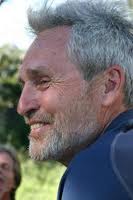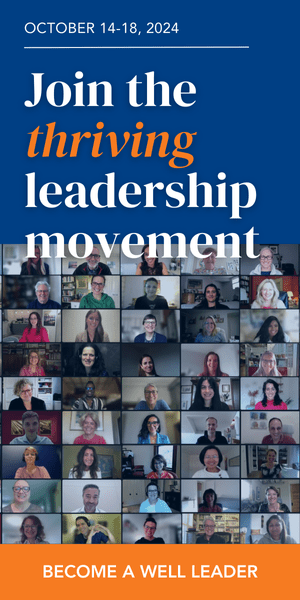We all complain about how meetings fill our days and weeks (consuming at least 30% of our work hours, by some estimates). But what if those meetings were opportunities to engage and grow? What if the very act of getting together could help us transform and enhance our wellbeing?
Craig Neal, Co-Founder and VisionHolder at Heartland Inc., believes that getting together can do just that. His Heartland programs are dedicated to creating authentic and essential conversations among individuals and within organizations. They educate and support leaders who are committed to turning their visions into wise and wholehearted action, improving their organizations, and by extension, creating the possibility of communities and what he calls a “world that works for all.”
I recently spoke with Craig, who is also, with his wife Patricia, the co-author of The Art of Convening: Authentic Engagement in Meetings, Gatherings, and Conversations. Craig is this week’s Wisdom Works Group The Face of Wellbeing Leadership.
What does leading wellbeing mean to you?
Craig Neal: Leading wellbeing means creating a space for people to transform. That’s what we do when we practice what we call “convening;” we create opportunities for people to engage in their own transformation and that of their organization. Wellbeing is absolutely tied to this transformation. Through convening, people see and experience themselves and others as whole, and they feel more connected with the world and with everything around them. A deep sense of wellbeing naturally comes from this.
What exactly is convening?
Craig Neal: The word “convene” has been around a long time but it was so ubiquitous it was kind of a throw-away word. If I’m going to convene something that must mean to bring people together, right? We didn’t think that was a full definition and started to take a look at what convening really means.
Convening is coming together in a safe and generous space – whether a meeting or a conversation – for the sake of the highest outcome of that engagement. Convening is a holistic approach where you engage in the heart of the matter: Who you are in relationship with others and why we engage in anything together. Convening is really the art and technology of relationships.
What happens during convening is what we call the “arc of recognition,” when one experiences oneself as being seen. Truly seen for who they are. And then simultaneously seeing another for who they really are. When we see each other at our essence—that is the arc of recognition. When that connection is made, things change dramatically. Relationships deepen and expand. We learn that we can connect and live differently. We’re using the technology of convening with a government agency right now and starting to see the lights go on for people. It can be a little threatening at first, but after a while people get used to it.
Is convening a global phenomenon?
Craig Neal: In all honesty, we work in North America, but our book was published in Denmark in 2012 and we have a group in Denmark that’s done some of our Art of Convening training. In Europe I would say there’s a very similar movement afoot. In some ways, people in Scandinavia, where they are used to collaborating and have a social framework underpinning their organizations, have come to the act of convening more naturally.
Especially since the popular media has become so polarized, what I’m noticing more and more everywhere is people saying “I’ve had enough of that. We need to collaborate.” That is now becoming more and more a part of the modern lexicon, especially in organizations. My read is that we are living in very paradoxical times—where it’s the best and worst simultaneously. So there’s a real desire for wholeness and collaboration wherever people are.
What lead you to this yourself?
Craig Neal: I went on the March on Washington in 1963 and experienced Martin Luther King delivering the I Have a Dream speech. That transformed my life, and it set me on a path knowing that my life would be of service to others. I had no idea how it would manifest or how it would turn out, but I developed the awareness that I’m here for a reason. I’ve realized that I’m a spiritual being and I my journey is about supporting transformation.
And this journey is a privilege. It’s not without pain, it’s not without suffering. I battle with self-doubt, depression. I’ve gone through all that, still do. But that to me feels what it’s naturally about to be a human being. And actually the more that I can see that, the more that I can have compassion to work in this area—to work with others and to see what everybody else is going through.
And you’re seeing transformation in others?
Craig Neal: 10 years ago Patricia and I wrote our individual vision stories. A big part of it was that in our life time we wanted to see the shift from a world that doesn’t work for everyone to a world that does work for all. And that’s part of our vision: a world that works for all. That’s what gets us up in the morning.
And today, when I walk down the street and say hello to people or when I help a team work together, I see more and more people that want to engage. They don’t look away. More and more people are seeing that their lives are tied to others. And this feels like at least a small step toward a world that can work for us all.
READ MORE
• Susie Ellis: How the Spa Industry Can Lead Wellbeing
• On the Road to Thriving: Motivating the Next Generation
• The Big Questions of Living an Inspired Life
(And 4 Big Answers!)
 Renee Moorefield, PhD
Renee Moorefield, PhD
A deep and early belief that the values of health and sustainability would remake the way we live, lead, and work in the 21st century led Renee to launch Wisdom Works with her husband David Moorefield in 1999. Ever since, she’s helped forward-thinking clients—including Apollo Group, Booz Allen Hamilton, Merck & Company, Centura Health, Western Union, and The Coca-Cola Company—embed wellbeing strategies to create inspired workplaces, develop caring relationships with citizens, and produce results that matter.







